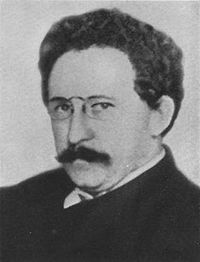
Hans Heinrich Georg Queckenstedt
Encyclopedia

Leipzig
Leipzig Leipzig has always been a trade city, situated during the time of the Holy Roman Empire at the intersection of the Via Regia and Via Imperii, two important trade routes. At one time, Leipzig was one of the major European centres of learning and culture in fields such as music and publishing...
– 9 November 1918, Harburg, Hamburg) was a German
Germany
Germany , officially the Federal Republic of Germany , is a federal parliamentary republic in Europe. The country consists of 16 states while the capital and largest city is Berlin. Germany covers an area of 357,021 km2 and has a largely temperate seasonal climate...
neurologist
Neurologist
A neurologist is a physician who specializes in neurology, and is trained to investigate, or diagnose and treat neurological disorders.Neurology is the medical specialty related to the human nervous system. The nervous system encompasses the brain, spinal cord, and peripheral nerves. A specialist...
remembered for describing Queckenstedt's phenomenon
Queckenstedt's maneuver
Queckenstedt's maneuver is an outdated clinical test, formerly used for diagnosing spinal stenosis. The test is performed by placing the patient in the lateral decubitus position, thereafter the clinician performs a lumbar puncture. The opening pressure is measured...
. He graduated from the University of Leipzig
University of Leipzig
The University of Leipzig , located in Leipzig in the Free State of Saxony, Germany, is one of the oldest universities in the world and the second-oldest university in Germany...
in 1900, having studied under Emil Kraepelin
Emil Kraepelin
Emil Kraepelin was a German psychiatrist. H.J. Eysenck's Encyclopedia of Psychology identifies him as the founder of modern scientific psychiatry, as well as of psychopharmacology and psychiatric genetics. Kraepelin believed the chief origin of psychiatric disease to be biological and genetic...
. He worked under Sigbert Josef Maria Ganser
Sigbert Josef Maria Ganser
Sigbert Josef Maria Ganser was a German psychiatrist born in Rhaunen. He earned his medical doctorate in 1876 from the University of Munich. Afterwards he worked briefly at a psychiatric clinic in Würzburg, and later as an assistant to neuroanatomist Bernhard von Gudden in Munich...
, and gained his doctorate in 1904. He worked in Rostock
Rostock
Rostock -Early history:In the 11th century Polabian Slavs founded a settlement at the Warnow river called Roztoc ; the name Rostock is derived from that designation. The Danish king Valdemar I set the town aflame in 1161.Afterwards the place was settled by German traders...
, and was habilitated
Habilitation
Habilitation is the highest academic qualification a scholar can achieve by his or her own pursuit in several European and Asian countries. Earned after obtaining a research doctorate, such as a PhD, habilitation requires the candidate to write a professorial thesis based on independent...
as Privatdozent
Privatdozent
Privatdozent or Private lecturer is a title conferred in some European university systems, especially in German-speaking countries, for someone who pursues an academic career and holds all formal qualifications to become a tenured university professor...
in 1913. He studied cerebrospinal fluid
Cerebrospinal fluid
Cerebrospinal fluid , Liquor cerebrospinalis, is a clear, colorless, bodily fluid, that occupies the subarachnoid space and the ventricular system around and inside the brain and spinal cord...
dynamics, noting the fluctuation of pressure with respiration. This led to experiments with the Valsalva manoeuvre and jugular vein
Jugular vein
The jugular veins are veins that bring deoxygenated blood from the head back to the heart via the superior vena cava.-Internal and external:There are two sets of jugular veins: external and internal....
pressure from which his eponymous test was published. During the First World War he was head of the army medical service in Harburg; he was thrown from a horse and killed by a passing truck two days before Armistice Day
Armistice Day
Armistice Day is on 11 November and commemorates the armistice signed between the Allies of World War I and Germany at Compiègne, France, for the cessation of hostilities on the Western Front of World War I, which took effect at eleven o'clock in the morning—the "eleventh hour of the eleventh day...
.

